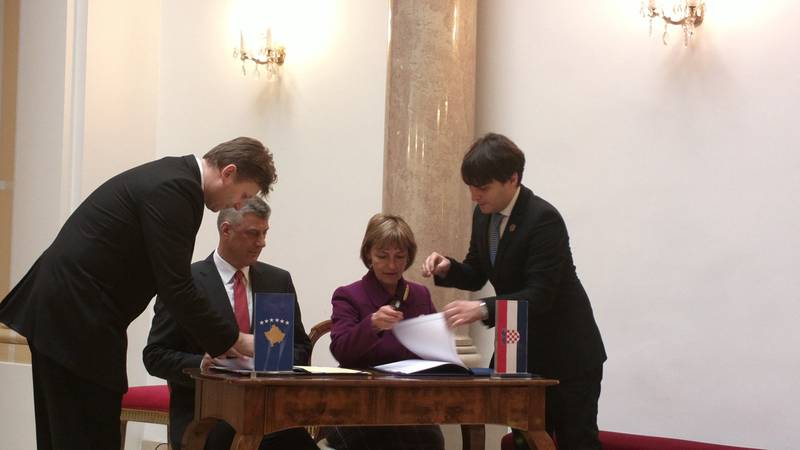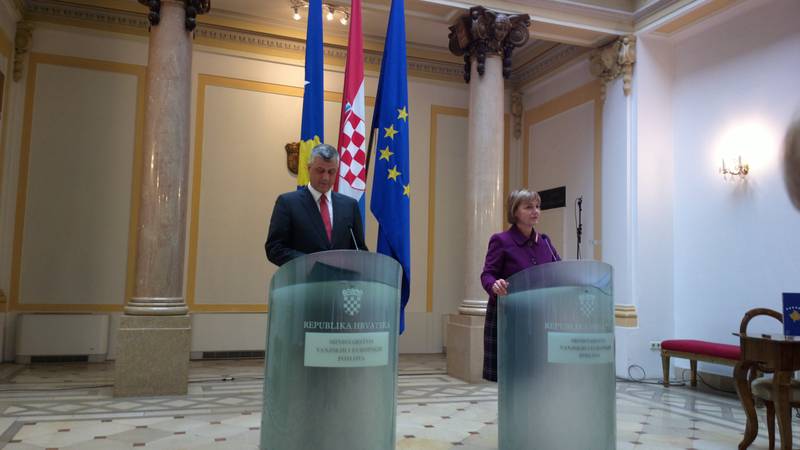Western Balkans Are Beginning To Put New Conditions to EU
Adelina Marini, April 9, 2015
 As a result of the reforms fatigue, the duration of the process, the weakening focus of the EU and the geopolitical shifts, the Western Balkans are starting to dictate the conditions. This has become crystal clear again on the occasion of the new tension that emerged between Serbia and Albania because of a statement by Albania Prime Minister Edi Rama. In an interview with a Kosovo television Mr Rama states that the unification of Albania with the former Serbian province Kosovo is "inevitable" and will happen either through EU membership or in another way. "Will it happen in the context of the EU as a natural process and understood by all, or will it happen as a reaction to EU blindness or laziness", the Albanian prime minister said, according to Reuters. This caused severe reactions in Serbia for whose government this statement was just a confirmation of their doubts that the idea of a Great Albania is not dead.
As a result of the reforms fatigue, the duration of the process, the weakening focus of the EU and the geopolitical shifts, the Western Balkans are starting to dictate the conditions. This has become crystal clear again on the occasion of the new tension that emerged between Serbia and Albania because of a statement by Albania Prime Minister Edi Rama. In an interview with a Kosovo television Mr Rama states that the unification of Albania with the former Serbian province Kosovo is "inevitable" and will happen either through EU membership or in another way. "Will it happen in the context of the EU as a natural process and understood by all, or will it happen as a reaction to EU blindness or laziness", the Albanian prime minister said, according to Reuters. This caused severe reactions in Serbia for whose government this statement was just a confirmation of their doubts that the idea of a Great Albania is not dead.
There was a reaction from the European Union as well. Maja Kocijancic, spokeswoman of EU High Representative for foreign and security policy Federica Mogherini and of EU Commissioner for enlargement negotiations Johannes Hahn, said that the Western Balkan countries have a clear European perspective but they are expected to conduct policies of reconciliation and good neighbourly cooperation. "All provocative statements that step back from such policies are unacceptable". To Serbia Prime Minister Alexander Vucic, however, the European reaction, though welcomed, is quite modest. "We continue in the future to strive for good relations with Albania and will insist on that but we will be showing every time what can and what cannot pass in the Balkans", Mr Vucic has warned.
His first deputy and Minister of Foreign Affairs Ivica Dacic was indignant with the slow and weak international reaction. "If a Serbian official had said something related to a country in the neighbourhood, they would have called the UN Security Council in no time", Ivica Dacic said and added: "I can only confirm the diagnose that we are all suffering together from the same syndrome and that is to make a step forward and two steps back".
According to Kosovo Deputy Prime Minister and Foreign Minister Hashim Thaci, however, Edi Rama's statement was interpreted in the wrong way. He said after his meeting with his Croatian counterpart Vesna Pusic in Zagreb that he attended the interview of the Albanian premier and Edi Rama did not mean a change of borders in the region but their visibility to be reduced in the entire region following the EU model. This means people to be able to freely move throughout the region as is in the EU. The first Deputy Prime Minister of Croatia and Minister of Foreign and EU Affairs Vesna Pusic said for her part that Hashim Thaci's interpretation about the incident was positive and recalled Croatia's firm stance, which is that borders in the EU are not to change. With EU membership they are liberalised and gradually their importance weakens but they do not change.
This is the second time when big tension emerges between Serbia and Albania. Last autumn the long-awaited first meeting in more than 50 years between prime ministers of the two countries was postponed because of an incident during a football game between Serbia and Albania on the Partizan stadium in Belgrade. Then, during the match, a drone waved the flag of Great Albania which led to clashes between the players and in the audience. And during the summit itself, which took place several weeks later, Serbia Prime Minister Alexander Vucic reacted badly to a remark by his Albanian counterpart that sooner or later Serbia would have to recognise the fact that Kosovo is an independent country. Unlike then, the Serbian government reacted much more modestly and in a contained manner to the statement of the Albanian premier from 7 April.
Visa liberalisation is a major demand for Kosovo
Kosovo is the only Western Balkan country for which the visa regime is still not liberalised. Vesna Pusic recalled, however, that in order for the regime to be liberalised it is necessary to meet several conditions one of which is building institutions. "Visa liberalisation is not a prize for invested efforts but a recognition of the level of functioning of the institutions", Ms Pusic emphasised saying that the process of liberalisation of Kosovo has been additionally hampered by the exodus of Kosovo asylum seekers. In January, some 10 000 Kosovars applied for asylum in Hungary which forced the country to request assistance from the EU border agency FRONTEX. Germany, too, sent additional border police officers. A major destination for the Kosovo asylum-seekers is Germany which last year rejected 99% of all the applications.
Kosovo still has serious issues with the building of institutions and introduction of the rule of law. This has been again a major criticism in the European Commission annual report on Kosovo's progress. "The rule of law in Kosovo, including judicial independence, and limited results in the fight against organised crime and corruption remains a major concern", the report of last October says. Fight against corruption and organised crime is also one of the main conditions in the visa liberalisation dialogue. Asked by euinside what will the government in Pristina do to change significantly the Commission conclusion, Mr Thaci gave a pretty uncommitting answer.
He recalled that Kosovo, just as all the other countries in the region, faces the same challenges and difficulties when it comes to the fight against corruption but that Kosovo has the advantage of international presence - the EU civil mission EULEX. Obviously having understood that all this sounds as transferring the responsibility entirely on the European mission, Hashim Thaci added that the government is aware that more needs to be done in this area and assured that the country is cooperating closely with the European partners.
Alas, it is growingly visible that the slowest advancing countries in the region are losing European enthusiasm and are more inclined to put forward conditions that require the EU to step back from its principles. The statement of the Albanian premier can be interpreted as a clear threat that unless the EU accelerated the process of European integration of the countries in the region, Albania including, it will pay a high price. Albania received a candidate country status just last year but it has not yet started accession negotiations. Serbia is on the same step of the European path and Kosovo is yet to sign the Stabilisation and Association Agreement which is considered as an antechamber of the accession process. The three countries have serious issues they need to resolve before that but obviously their will and patience are weakening.
With the growing exigence of the enlargement process and of the geopolitical tensions these countries are getting more and more frustrated by the tightening of the European integration belt. This leads to provocations and pure threats. Serbia, for instance, is required to impose sanctions against Russia but Belgrade believes that this is too harsh a condition, especially bearing in mind that no chapters have been opened yet. The message of Serbia EU Affairs Minister Jadranka Joksimovic was refined but clear nonetheless: "We, as a candidate, understand the importance of Chapter 31 and, of course, that we also know that we have to progressively align with all the conditions and standards. We are a candidate country and we haven't opened a single chapter yet, so it's also a realistic approach that i t's not easy to be part of all decisions that you haven't been involved in". Serbia is also expected to apply the agreement for normalisation of relations with Kosovo.
t's not easy to be part of all decisions that you haven't been involved in". Serbia is also expected to apply the agreement for normalisation of relations with Kosovo.
This is even separated in an individual chapter - Chapter 35 - whose content is not yet clear. This chapter will be opened in the very beginning of the negotiations process, as will the rule of law chapters (23 and 24), and will be closed last. To some this means a recognition of Kosovo. This is what Kosovo's top diplomat Hashim Thaci believes too. In an interview with Croatian daily Vecernji list he said that, practically, Serbia has already recognised Kosovo. For now, this is not put forward formally as a condition. In addition are also the much tighter conditions in all other chapters after the bitter experience with Bulgaria and Romania. To all this, however, official Belgrade says that the EU itself is far from being as perfect as it demands of Serbia to be. Last year, Serbia Foreign Minister Ivica Dacic even proposed half-jokingly all member states to pass a health-check every 10 years. "I am sure that some of the EU member states would not pass the current phase of negotiations we are going through", he said then.
Macedonia as well has has had a candidate status for 10 years but has not started negotiations yet because of Greece's blockade but also because of its own refusal to be involved in a constructive dialogue on finding a solution to the name issue. It is obvious that Brussels's policy - first meet the conditions and then we will see - is no longer attractive. This is even more obvious against the backdrop of the changed approach for Bosnia and Herzegovina. And although all cases in the Western Balkans are different what unites them is their poverty and lack of perspectives. If the EU turns into a hard-to-achieve goal for them they will start turning into dangerous black holes, just like Macedonia, that could suck the entire region. EU should not underestimate the sparks that are flashing among the countries in the region because they are a symptom of problems that have been ignored for a long time.
 Bakir Izetbegovic, Andrej Plenkovic | © Council of the EU
Bakir Izetbegovic, Andrej Plenkovic | © Council of the EU Aleksandar Vucic, Recep Tayyip Erdogan | © Serbian Presidency
Aleksandar Vucic, Recep Tayyip Erdogan | © Serbian Presidency Jean-Claude Juncker, Zoran Zaev | © European Commission
Jean-Claude Juncker, Zoran Zaev | © European Commission